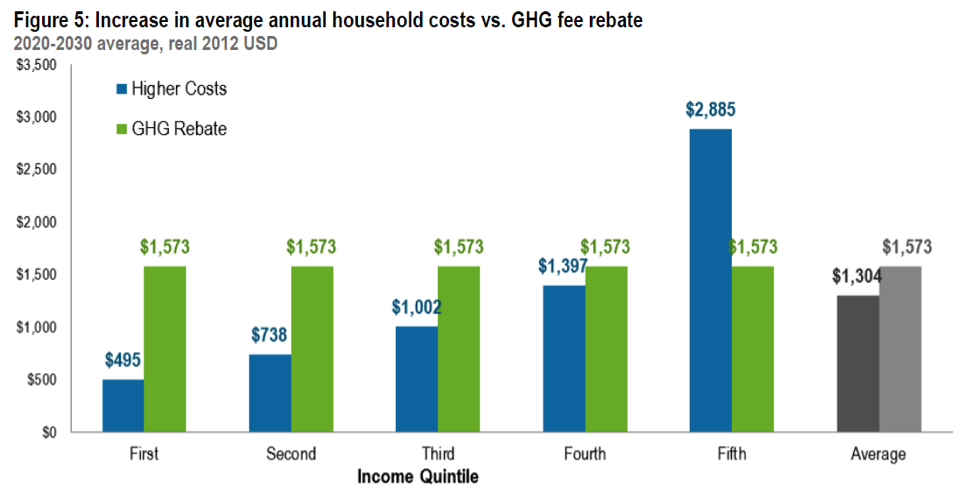According to a document released by WikiLeaks, on January 20, 2015 some of Hillary Clinton’s energy advisors wrote a memo to Sec. Clinton considering the possibilities of a carbon tax. In the memo, however, Clinton’s advisors explain how a carbon tax would disproportionally harm the poor.
The advisors write:
It is important to note that any policy that increases energy costs – including the recently announced EPA regulations on power plants and methane emissions — will disproportionately impact low-income households.
These advisors understand that a carbon tax has two important economic impacts. First they understand that a carbon tax increases the cost of energy. They write, “Preliminary analysis suggests a $42 per ton GHG fee would raise average annual energy costs by $478 per household between 2020 and 2030.” Second, that increasing the cost of energy drives up the costs of other goods and services. They explain:
The cost of other household goods and services would increase as well as companies pass forward the higher energy costs paid to produce those goods and services on to consumers. Price increases for non-energy goods would be quite small (generally less than 1%), but given the number of goods effected, the overall impact on household expenditures would be material. As with the increase in energy costs, the increase in the cost of non-energy goods and services would disproportionately impact low-income households.
We agree and it’s good to see Clinton’s advisors admitting as much.
The memo includes the following chart showing the household costs of a $42 a ton carbon tax. The chart also shows a GHG rebate to alleviate the regressive impacts of a carbon tax.

In theory a GHG rebate might alleviate some of the concerns these carbon tax proponents have for increasing energy costs for low-income families, but there are a number of real-world problems with such a rebate.
A major problem is that competing special interest groups want to use the proceeds from a carbon tax for different purposes. The brouhaha over the proposed carbon tax in Washington State shows why such a rebate would be difficult.
Washington state’s carbon tax proposal would use the revenue to reduce the state sales tax, fund a rebate for lower-income households, and eliminate the business and occupation tax. This sounds like a proposal that would garner support from the left, but that isn’t the case. This plan is opposed by an alliance of groups on the left because they want to spend the carbon tax revenue on their own priorities. Dave Roberts of Vox explains:
the alliance’s core objection to I-732 is that it is revenue-neutral — it surrenders all that precious revenue, which is so hard to come by in Washington. That, more than anything else, explains why alliance groups are not supporting it.
Their calculus is simple: Properly dealing with climate change requires lots of investment, and if a price on carbon doesn’t fund that investment, what will? Given how difficult it is to raise revenue in the state, the idea, often put forward by I-732 proponents, that greens can simply find that money somewhere else is, in the alliance’s view, naive to the point of malice.
Labor groups want investments to incentivize green manufacturing and retrain displaced workers. Communities of color and low-income groups want “a share of the money to go to the infrastructure that we need to weather climate change,” says Schaefer, like affordable housing near public transit. Tax cuts and credits “are not going help the folks I work with go out and buy a [Nissan] Leaf,” Schaefer says.
As the earlier chart shows, a carbon tax would harm all Americans—especially lower-income Americans. And while a carbon tax would undoubtedly generate billions of dollars in new tax revenue, there would be no way to implement the sort of rebate system outlined by Clinton’s advisors because so many different special interests groups want a piece of the revenue.
Furthermore, even if a carbon tax rebate would set up as the advisers suggest, there is little reason to believe that it will remain that way long term. There are always competing priorities for money and over time the rebates would likely fall.
Conclusion
In sum, it’s good to see the carbon tax proponents admitting that a carbon taxes increases costs for all Americans and “would disproportionately impact low-income household.” As the situation in Washington state shows, the groups on the left want the carbon tax revenue, but all of the groups want to spend the money in different ways, making it incredibly difficult to set up a carbon tax that would garner enough support on the left, let alone the right.
The post Clinton camp admits that carbon tax would disproportionally harm the poor appeared first on IER.
No comments:
Post a Comment